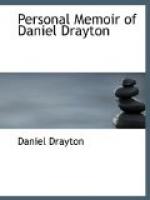negroes. This suggestion, which outruns all
reason and discretion, is founded on the simple
fact of a brig seen lying at anchor in a place
of common anchorage, suggesting no suspicious
appearance, but as to which you are asked to infer
that these seventy-six slaves were to be transported
into her, and carried to Cuba or elsewhere for
sale. What a monstrous imagination! What
a gross libel on that brig, her officers, her
crew, her owners, all of whom are thus charged
as kidnappers and pirates; and all this baseless
dream got up for the purpose of influencing your
minds against the prisoner! It marks, indeed,
with many other things, the style in which this
prosecution is conducted.
“Take the law as laid down by the court, and it is necessary for the government to prove, if this indictment is to be sustained, that the prisoner corrupted the minds of Houver’s slaves, and induced and persuaded them to go on board his vessel. They were found on board the prisoner’s vessel, no doubt; but as to how they came there we have not a particle of evidence. Here is a gap, a fatal gap, in the government’s case. By what second-sight are you to look into this void space and time, and to say that Drayton enticed them to go on board? [The counsel here read from 1 Starkie on Evidence, 510, &c., to the effect that the prosecution are bound by the evidence to exclude every hypothesis inconsistent with the prisoner’s guilt.] Now, is it the only possible means of accounting for the presence of Houver’s slaves on board to suppose that this prisoner enticed them? Might not somebody else have done it? Might they not have gone without being enticed at all? We wished to call the slaves themselves as witnesses, but the law shuts up their mouths. Can you, without any evidence, say that Drayton enticed them, and that by no other means could they come onboard? Presumptive evidence, as laid down in the book—an acknowledged and unquestioned authority—from which I have read, ought to be equally strong with the evidence of one unimpeached witness swearing positively to the fact. Are you as sure that Drayton enticed those slaves as if that fact had been positively sworn to by one witness, testifying that he stood by and saw and heard it? If you are not, then, under the law as laid down by the court, you can not find him guilty.
“Thursday, Aug. 13.
“Carlisle, for the prisoner.—The sun under which we draw our breath, the soil we tottle over, in childhood, the air we breathe, the objects that earliest attract our attention, the whole system of things with which our youth is surrounded, impress firmly upon us ideas and sentiments which cling to us to our latest breath, and modify all our views. I trust I am man enough always to remember this, when I hear opinions expressed and views maintained by men educated under a system different from that prevailing here, no matter how contrary those views and opinions may be to




